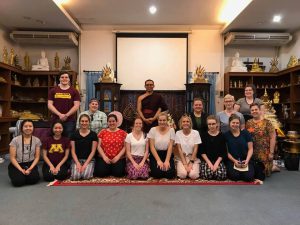 An experience that has stood out to me thus far on the trip was the Monk Chat that we were able to partake in. Growing up Catholic, I’ve only ever deeply known and understood that one faith. I had never been given the opportunity to hear from a first hand experience about another faith or way of living. Last summer, I tried to push myself to begin learning about other religions, specifically Hinduism and Buddhism. With Google as my best friend, that learning train quickly ended – there were so many details about holidays, traditions, different variations of each religion, different interpretations and variations of X, Y, and Z. It all became so overwhelming that I found myself spending hours on information that provided me with great detail but left me confused on what the main purpose or perspective each religion took.
An experience that has stood out to me thus far on the trip was the Monk Chat that we were able to partake in. Growing up Catholic, I’ve only ever deeply known and understood that one faith. I had never been given the opportunity to hear from a first hand experience about another faith or way of living. Last summer, I tried to push myself to begin learning about other religions, specifically Hinduism and Buddhism. With Google as my best friend, that learning train quickly ended – there were so many details about holidays, traditions, different variations of each religion, different interpretations and variations of X, Y, and Z. It all became so overwhelming that I found myself spending hours on information that provided me with great detail but left me confused on what the main purpose or perspective each religion took.
Walking in to the Monk Chat, I definitely had my expectations: that the Monk was going to be serious and demand respect. However, Kae Kae COMPLETELY shifted my view of what a traditional Monk “should be” and what Buddhism truly is. First of all, he cracked jokes. I know that seems simple and a bit naive, but in all honesty, I did not know what to expect on how a Monk should act. I found myself doing what humans so often deny doing but happens all the time: creating an other. Before talking to the monk, I assumed he was going to have his nose in the air and talk about a way of life that I could not relate to. I was pleasantly surprised and challenged when Kae Kae introduced himself warmly, saying jokes and even seeming genuine during our introductions (which, speaking from experience, can be very hard to do). A big learning moment for me from this experience is I am constantly putting people into boxes: my family, friends, strangers, peers, etc. I am constantly putting ideas and people into compartments that create this sense of “other” and that I can’t relate to their experiences, their joy, their suffering completely.
However, as Kae Kae talked more about the broader ideas of Buddhism, the more I realized why I began to explore other religions outside of Catholicism more: I have so much to realize and how I was raised was not always right. What struck me the most interesting was when the Monk expressed that Buddhism is not a religion; one can be a Christian monk, Jewish monk, etc. It is not a religion, but a way of thinking; a way of life that puts suffering into perspective. As someone who dwells a lot, on past, present and especially future, I related to and appreciated the words of wisdom from the monk. While I did not experience the death of both of my parents, I could still understand the suffering that Kae Kae was talking about and it reminded me of the philosophical question: “if a tree falls in the woods and no one hears it, does it make a sound?”
Kae Kae talked about the death of his mother and found himself asking, “why did my mom die?” He elaborated on how millions of mothers die a day, and he doesn’t cry, but when his mother dies, he cries; the rest of the world didn’t cry, but he cried. It reminded me of the tree: millions of trees fall a day unheard; but what if that tree was the tree someone proposed under, or carved their name in to? They may not hear the sound waves of the tree falling, but they feel the emotional crashing of the tree. I also found the words of the monk to relate to what our tour guide said on the second day in Bangkok on our way to the airport, “only today.” From my brief introduction into Thai culture and Buddhist culture, I see this prevalence of living for today because that’s all you can control. You can’t change the past because it happened, and you can’t change the past because it doesn’t exist yet. All you can focus on is taking that next step closer to your goals and to live for today.
